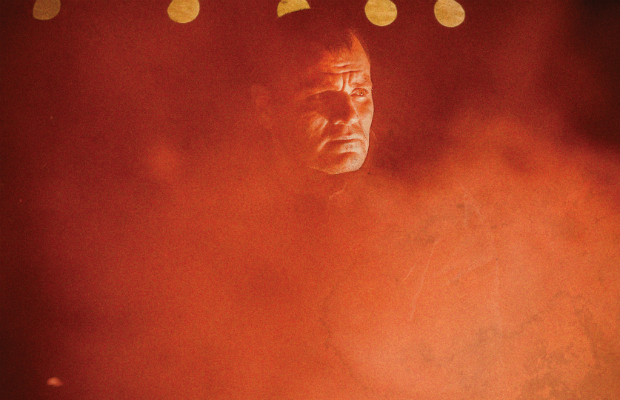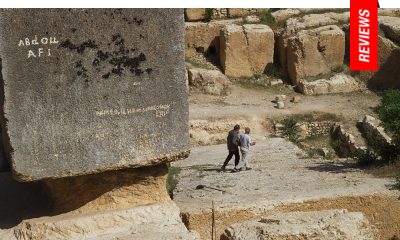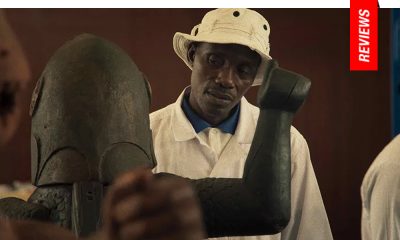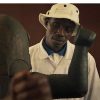Reviews
Crocodile Gennadiy | 2015 Tribeca Film Festival Review
Soviet Nostalgia: Hoover’s Complex Portrait of a Ukrainian Vigilante Pastor Opens Cultural Can of Worms
Steve Hoover’s sophomore feature opens on a Ukrainian industrial landscape overlayed with the following quote from My First Fee by Isaac Babel, a Russian author whose futile death came at the hands of the Soviet secret police: “A well thought out story doesn’t need to resemble real life. Life itself tries with all its might to resemble a well-crafted story.” Out of context, it merely foreshadows the high tension tale to follow, yet knowing Babel’s fate – which isn’t mentioned in the film – brings greater depth to the Ukrainian/Russian situation that snowballs throughout. In Crocodile Gennadiy, what begins as an astounding, morally murky portrait of a man subverting inert government organizations to rescue abused children morphs into a something more akin to a unraveling sketch of a man clutching his overflowing family, bracing for the waves of political unrest that are guaranteed to turn his life upside down.
This is the tale of an extraordinary human being, named Gennadiy Mokhnenko, whose personal mission in life is to better the lives of the unfortunates – drug addicts and the destitute children they’ve carelessly brought into the world – that inhabit his community of Mariupol and his vigilante actions to guarantee this outcome. The film comes in the wake of 2013’s heart wrenching Sundance Jury Prize award winner, Blood Brother, a film that seemed to come out of nowhere to wow audiences and critics alike, and apparently even the likes of Terrence Malick and Atticus Ross who came on to Hoover’s latest project to executive produce and serve as composer, respectively. Understandably, expectations have been raised, but Hoover has delivered a whopper of a follow-up that begins with child body horror and a righteous kidnapping and only surprises from there, never allowing for a traditional narrative to set in, keeping us anxiously off guard until the very end in the best possible way.
Reminiscent of the vivacious editing and lively camera work that gave such life and narrative propulsion to Blood Brother, here Hoover weaves this complex portrait of Gennadiy – a pastor, public speaker, paladin and adopted parent to seemingly countless children – with similar verve, though with a tense, white-knuckled tone set by Atticus Ross’s moody a-tonal score. The narrative effortlessly shifts between Gennadiy’s rescue operations in which he basically abducts abused or drug addicted homeless children and places them in his Pilgrim Republic rehabilitation center – the largest organization of its kind in the former Soviet Union – because no official organization has the zeal or resources to do such a thing, to public speaking engagements in which he gives hope to women in treatment still visually struggling, to secluded personal proclamations about his professional motives and life experiences and so on. It all feels incredibly fluid, yet focused, despite cinematographer John Pope’s continuous use of shifting focal points that draw attention and distract in equal measure.
Fascinatingly, Gennadiy’s story plays out in unison with a famed Russian stop-motion picture by Roman Kachanov called Gena the Crocodile, in which the title character gets lonely living in his apartment solo, subsequently meets a homeless puppy, and together they decide to build a house for all the lonely citizens of the city, but are challenged in different ways by a crabby old lady who attempts to stop them. Acknowledging the parallels between Gena and his own stories, Gennadiy has adopted the persona as his own, humorously referring to himself as Pastor Crocodile for the many children he interacts. The persona fits too. Bulky, muscular, projecting with a rugged, authoritative voice, Gennadiy appears more tough guy than pastor before bearing the collar – and it works wonders when confronting the accused. He’s an incredible character, effortlessly charismatic, incredibly empathetic, and yet, a fist bearing badass if need be. What’s more, Hoover has ingeniously intercut bits from Kachanov’s film to not only echo the cartoonish superhero persona that his protagonist embodies, but to remind us that he is dealing with the lives of children who deserve better than to live on the streets or deal with the horrors of addiction.
The cinematic parallel also reminds us that the socialist Soviet dreams of communal housing that were embedded so deeply that they feature as the central idea in beloved children’s programming are the stuff of a fallen empire sadly still clamouring for power today. Reflecting his fractured nation and its tumultuous history, Gennadiy himself actively devotes his life to similar ideals while swearing to protect his hometown from the impending Russian forces who even now are looming just east of Mariupol. He hates the ideals that Lenin instilled within the cultural fabric of his nation, yet he can’t help but feel just a little nostalgic. It is in this complex political and moral grey area that Crocodile Gennadiy thrives. There are no easy answers, but with this gorgeously composed, bracing and laudably intricate portrait of off-the-grid heroism, Hoover poses some incredibly hard questions while commending a man for his extreme efforts in the face of utter despair – an admirable act in its own right.
Reviewed on April 18th at the 2015 Tribeca Film Festival – 97 Mins.
★★★★/☆☆☆☆☆






























